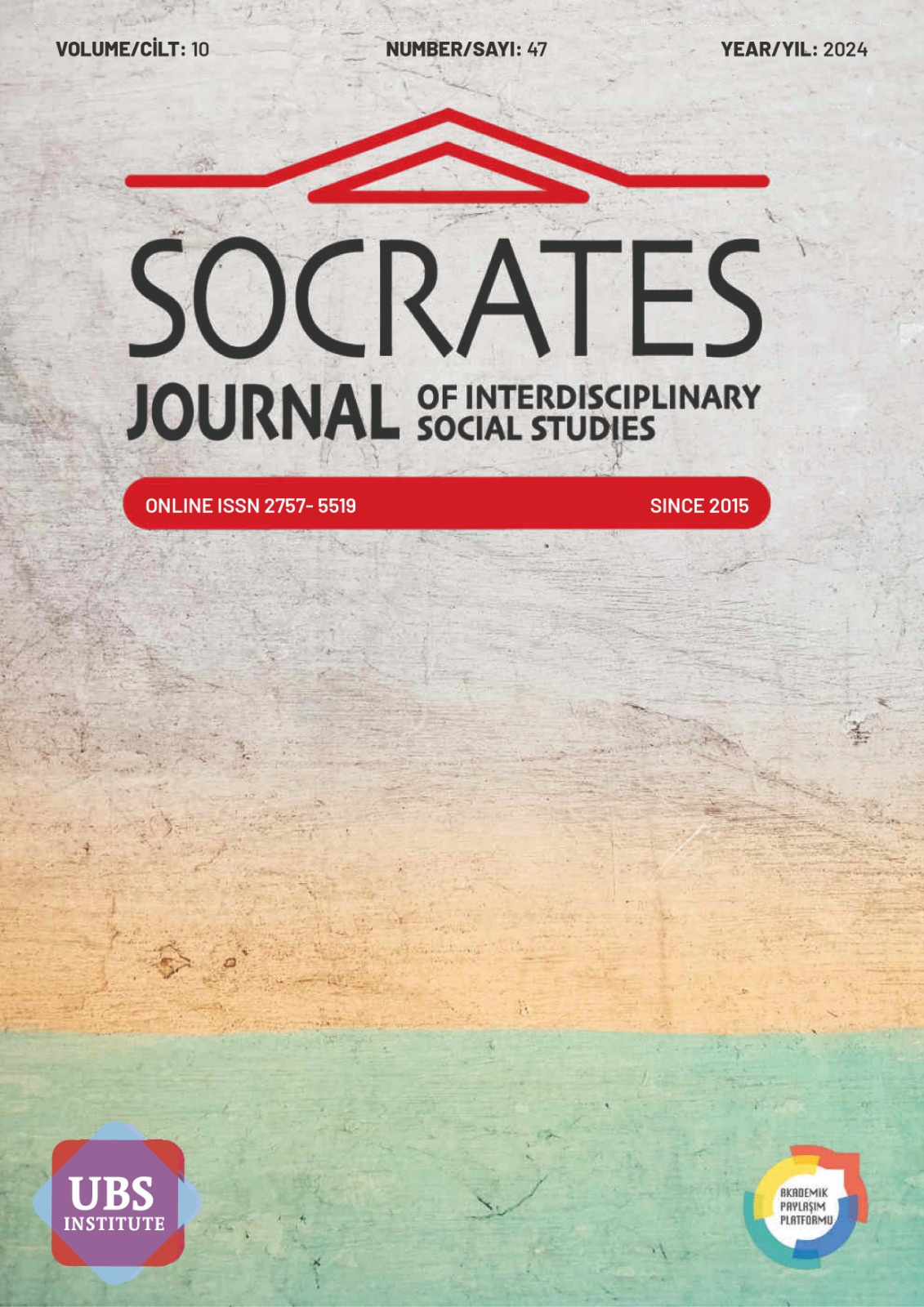MÜZİK ÖĞRETMENLERİNİN KOLEKTİF ÖĞRETMEN YETERLİĞİ İLE MESLEKİ MOTİVASYON DÜZEYLERİNİN İLİŞKİSEL OLARAK İNCELENMESİ
A RELATIONAL INVESTIGATION OF MUSIC TEACHERS’ COLLECTIVE TEACHER EFFICACY AND PROFESSIONAL MOTIVATION LEVELS
DOI:
https://doi.org/10.5281/zenodo.14202392Anahtar Kelimeler:
Müzik Öğretmeni, Kolektif Öğretmen Yeterliği, Mesleki Motivasyon.Özet
Bu araştırma, müzik öğretmenlerinin kolektif öğretmen yeterliği ile mesleki motivasyonları arasındaki ilişkiyi derinlemesine incelemeyi amaçlamaktadır. Bu temel amaca ek olarak, müzik öğretmenlerinin kolektif öğretmen yeterliği ile mesleki motivasyonlarının cinsiyet, medeni durum, mesleki kıdem ve eğitim durumu gibi demografik değişkenler açısından farklılık gösterip göstermediği de değerlendirilmiştir. Çalışma, betimsel nitelikli ilişkisel tarama ve nedensel karşılaştırma deseni ile gerçekleştirilmiştir. Araştırmanın evreni, Ankara’nın Çankaya ilçesindeki devlet ve özel okullarda görev yapan ortaokul müzik öğretmenlerinden oluşmaktadır. Elverişli örneklem yöntemi ile belirlenen örneklem grubunda 120 öğretmene ulaşılmış ve veriler bu öğretmenlerden toplanmıştır. Veri toplama sürecinde "Kişisel Bilgiler Formu", "Kolektif Öğretmen Yeterliği Ölçeği" ve "Öğretmen Mesleki Motivasyonu Ölçeği" kullanılarak öğretmenlerin mesleki yeterliği ve motivasyon düzeyleri değerlendirilmiştir. Veri analizinde frekans, yüzde, ortalama ve standart sapma gibi tanımlayıcı istatistikler kullanılmıştır. Ayrıca dağılımın normalliğini test etmek amacıyla Kolmogorov-Smirnov testi uygulanmıştır. Gruplar arasındaki farkları belirlemek için ise parametrik olmayan testlerden Mann-Whitney U testi ve Kruskall Wallis testi kullanılmıştır. Araştırma sonuçları, müzik öğretmenlerinin kolektif öğretmen yeterliklerinin genel olarak yüksek düzeyde olduğunu ortaya koymuştur. Cinsiyet, medeni durum, mesleki kıdem ve eğitim durumu gibi değişkenlere göre kolektif öğretmen yeterliği düzeylerinde farklılıklar gözlemlenmiş, ancak mesleki kıdemin kolektif öğretmen yeterliği üzerinde anlamlı bir etkisinin olmadığı belirlenmiştir. Aynı şekilde, müzik öğretmenlerinin mesleki motivasyon düzeyleri de yüksek olarak saptanmış; ancak bu düzeylerin cinsiyet, mesleki kıdem ve eğitim durumu değişkenlerine göre anlamlı bir farklılık göstermediği sonucuna ulaşılmıştır. Buna karşın, medeni durumun mesleki motivasyon üzerinde anlamlı bir etkisinin olduğu tespit edilmiştir.
Referanslar
Arıkan, G. (2018). Akademisyenlerin akademik tükenmişlik ve mesleki motivasyon düzeyleri arasındaki ilişkinin incelenmesi. Yüksek Lisans Tezi. Beykent Üniversitesi Sosyal Bilimler Enstitüsü, İstanbul.
Arslantaş, H. İ., Tösten, R., & Beştaş Marakçı, D. (2018). Lise öğretmenlerinde mesleki motivasyon unsurları: Karma yöntemli bir çalışma. Mersin Üniversitesi Eğitim Fakültesi Dergisi, 14(3), 880-895.
Aycan, M. M. (2020). Öğretmenlerde mesleki motivasyon ve örgütsel vatandaşlık davranışı arasındaki ilişki. Yüksek Lisans Tezi, Pamukkale Üniversitesi Eğitim Bilimleri Enstitüsü, Denizli.
Danış, M. (2020). Kolektif öğretmen yeterliliğinin öğretmenlerin yapısal güçlendirilme ile ilişkisine yönelik öğretmen görüşleri. Yayımlanmamış Yüksek Lisans Tezi, Bolu Abant İzzet Baysal Üniversitesi Eğitim Bilimleri Enstitüsü, Bolu.
Demir, S. (2016). Akademisyenlerin mesleki motivasyonu ve iş tatmini arasındaki ilişki. Yüksek Lisans Tezi, Yüzüncü Yıl Üniversitesi Eğitim Bilimleri Enstitüsü, Van.
Düren, A. Z. (2000). 2000’li Yıllarda Yönetim. İstanbul: Alfa Basım Yayım Dağıtım.
Erdoğan, U. & Dönmez, B. (2015). Kolektif öğretmen yeterliği ölçeğinin Türkçeye uyarlanması: Geçerlik ve güvenirlik çalışması. Kuram ve Uygulamada Eğitim Yönetimi, 21(3), 345-366.
Ertürk, R. (2016). Öğretmenlerin iş motivasyonları. Eğitim Kuram ve Uygulamaları Araştırma Dergisi, 2(3), 1-15.
Goddard, R. D., and Skra, L. (2006). The influence of school social composition on teachers’ collective efficacy beliefs. Educational Administration Quarterly, 42(2), 216-235.
Güleryüz, D. (2017). Öğretmenlerin örgütsel güven seviyeleri ve motivasyon seviyeleri ilişkisinin incelenmesi: Bursa ili Nilüfer ilçesi örneği. Yüksek Lisans Tezi, Yeditepe Üniversitesi Eğitim Bilimleri Enstitüsü, İstanbul.
Gürçay, D., Yılmaz, M., & Ekici, G. (2009). Öğretmen kolektif yeterlik inancını yordayan faktörler. Hacettepe Üniversitesi Eğitim Fakültesi Dergisi, 36(36), 119-128.
Karayiğit, M. (2019). Okul müdürlerinin etkili iletişim biçimleri ile öğretmenlerin mesleki motivasyonları arasındaki ilişki. Yüksek Lisans Tezi, Düzce Üniversitesi Sosyal Bilimler Enstitüsü, Düzce.
Kırıştı, B. (2017). Öğretmenlerin kolektif yeterlilik algıları ile örgütsel bağlılık algıları arasındaki ilişkinin incelenmesi. Yayımlanmamış Yüksek Lisans Tezi, Yeditepe Üniversitesi Eğitim Bilimleri Enstitüsü, İstanbul.
Koca, Y., & Çelik, T. (2023). Öğretmenlerin Kolektif Yeterlilik Algılarının Değerlendirilmesi. Çağdaş Uygulamalı Bilimler Dergisi, 1(1), 12–21.
Kurt, T. (2012). Öğretmenlerin öz yeterlik ve kolektif yeterlik algıları. Türk Eğitim Bilimleri Dergisi, 10(2), 195-227.
Kuzgun, Y., & Bacanlı, F. (2005). Pdr’de Kullanılan Ölçekler. Nobel Yayın, Ankara.
Özerten, K. N. (2018). Okul yöneticilerinin algılanan otantik liderlik özelliklerinin öğretmenlerin mesleki motivasyonuna etkisi. Yüksek Lisans Tezi, İstanbul Sabahattin Zaim Üniversitesi Sosyal Bilimler Enstitüsü, İstanbul.
Tschannen-Moran, M., Hoy, A. W., and Hoy, W. K. (1998). Teacher efficacy: Its meaning and measure. Review of educational research, 68(2), 202-248.
Uçan, A. (1996). İnsan ve Müzik İnsan ve Sanat Eğitimi. Ankara: Müzik Ansiklopedisi Yayınları.
Uzunpınar, H. (2019). İlkokul yöneticileri ve sınıf öğretmenlerinin örgütsel bağlılık ve mesleki motivasyonları arasındaki ilişkinin incelenmesi. Yüksek Lisans Tezi, İstanbul Sabahattin Zaim Üniversitesi Sosyal Bilimler Enstitüsü, İstanbul.
Ünver, T. (2021). Öğretmen mesleki öğrenme topluluğu ile kolektif öğretmen yeterliği arasındaki ilişkinin incelenmesi. Yayımlanmamış Yüksek Lisans Tezi, Karabük Üniversitesi Lisansüstü Eğitim Enstitüsü, Karabük.
Zafer-Güneş, D. (2014). İlköğretim Okulu Öğretmenlerinin Örgütsel Güven ve Kolektif Yeterlik Algıları ile Örgütsel Farkındalık Düzeyleri Arasındaki İlişkilerin İncelenmesi. Yayımlanmamış Doktora Tezi, Abant İzzet Baysal Üniversitesi Eğitim Bilimleri Enstitüsü, Bolu.
İndir
Yayınlanmış
Nasıl Atıf Yapılır
Sayı
Bölüm
Lisans
Telif Hakkı (c) 2024 Socrates Journal of Interdisciplinary Social Studies

Bu çalışma Creative Commons Attribution 4.0 International License ile lisanslanmıştır.


